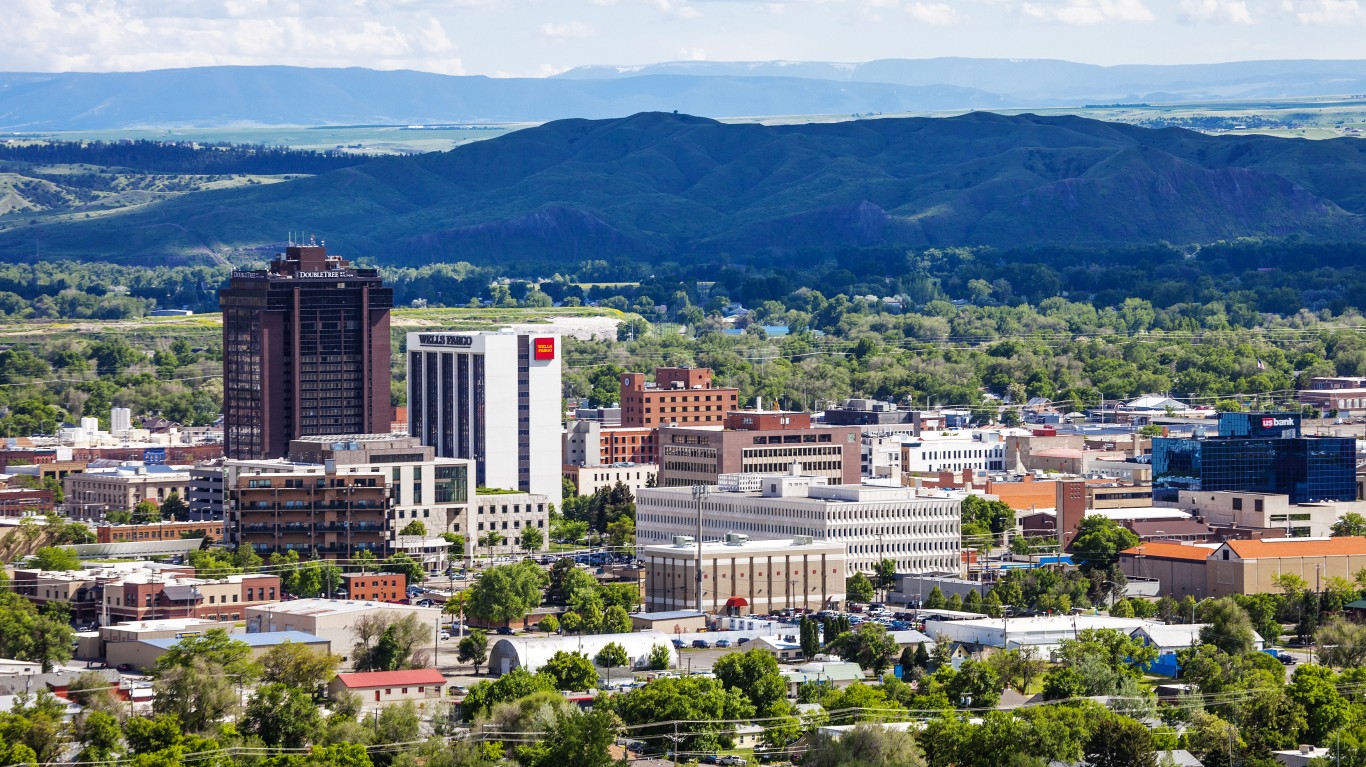

As the novel coronavirus continues to spread across the globe, variants of the virus also continue to emerge. Many of these new variants are more contagious than their predecessors and have added a new urgency to vaccine distribution.
The Biden Administration’s ambitious plan to vaccinate 300 million Americans by the end of the summer faces multiple challenges — and not all of them are related to distribution or production. According to a recent survey conducted by the U.S. Census Bureau, 44,970,000 Americans — or 18.0% of the 18 and older population — say they will either probably or definitely not agree to receive the vaccination when given the opportunity.
The share of eligible residents who will likely refuse vaccination varies considerably nationwide, from as many as 32.8% of the adult population to as little as 8.4%, depending on the state. States where the largest shares of adults are open to taking the vaccine are concentrated in the Northeast.
The majority of Americans who are against personally taking the vaccine cite one of three reasons: either they are concerned about possible side effects, or they want to wait to see if it is safe, or they think that others would benefit more than themselves from a vaccination. Others cite different reasons.
Nationwide, 19,860,000 people, 8.0% of the eligible population, do not trust the COVID-19 vaccines, and another 8,530,000, or 3.4%, do not trust vaccines in general. Additionally, 17,660,000 American adults, 7.1% of those eligible, will likely refuse a vaccination because they do not trust the government.
Meanwhile, the virus continues to spread. In the last week alone, another 496,320 Americans tested positive for the virus and 14,266 have died. Since the beginning of the pandemic, there have been 28,264,994 confirmed cases of the virus and a total of 497,759 Americans have died as a result.
So far, only 25,466,405 Americans — or 10.2% of the total population — have received the full course of vaccinations necessary to protect against COVID-19.
All survey data used in this story was published by the Census on Feb. 24, 2021. All data related to COVID-19 infections, fatalities, and vaccinations is current as of Feb. 28, 2021.

Alabama
> Adults who will likely or definitely refuse vaccination: 1,000,988 (26.9% of total)
> Adults who will likely or definitely get vaccinated: 2,030,915 (54.6% of total)
> Adults who are fully vaccinated: 308,416 (8.3% of total)
> Confirmed cases of COVID-19 to date: 10,091 per 100,000 people (total: 493,252)
> COVID-19-related fatalities to date: 203 per 100,000 people (total: 9,929)

Alaska
> Adults who will likely or definitely refuse vaccination: 125,575 (23.9% of total)
> Adults who will likely or definitely get vaccinated: 230,262 (43.9% of total)
> Adults who are fully vaccinated: 100,024 (19.1% of total)
> Confirmed cases of COVID-19 to date: 7,905 per 100,000 people (total: 58,293)
> COVID-19-related fatalities to date: 39 per 100,000 people (total: 287)
These are all the counties in Alaska where COVID-19 is slowing (and where it’s still getting worse).

Arizona
> Adults who will likely or definitely refuse vaccination: 1,047,397 (18.7% of total)
> Adults who will likely or definitely get vaccinated: 3,308,337 (59.1% of total)
> Adults who are fully vaccinated: 566,500 (10.1% of total)
> Confirmed cases of COVID-19 to date: 11,389 per 100,000 people (total: 816,782)
> COVID-19-related fatalities to date: 223 per 100,000 people (total: 15,980)

Arkansas
> Adults who will likely or definitely refuse vaccination: 656,388 (29.2% of total)
> Adults who will likely or definitely get vaccinated: 1,137,472 (50.6% of total)
> Adults who are fully vaccinated: 233,135 (10.4% of total)
> Confirmed cases of COVID-19 to date: 10,698 per 100,000 people (total: 322,415)
> COVID-19-related fatalities to date: 174 per 100,000 people (total: 5,243)

California
> Adults who will likely or definitely refuse vaccination: 3,635,500 (12.1% of total)
> Adults who will likely or definitely get vaccinated: 20,203,729 (67.5% of total)
> Adults who are fully vaccinated: 2,744,770 (9.2% of total)
> Confirmed cases of COVID-19 to date: 8,786 per 100,000 people (total: 3,475,562)
> COVID-19-related fatalities to date: 131 per 100,000 people (total: 51,979)

Colorado
> Adults who will likely or definitely refuse vaccination: 588,307 (13.2% of total)
> Adults who will likely or definitely get vaccinated: 3,074,905 (69.0% of total)
> Adults who are fully vaccinated: 479,662 (10.8% of total)
> Confirmed cases of COVID-19 to date: 7,505 per 100,000 people (total: 427,462)
> COVID-19-related fatalities to date: 104 per 100,000 people (total: 5,945)

Connecticut
> Adults who will likely or definitely refuse vaccination: 303,416 (11.1% of total)
> Adults who will likely or definitely get vaccinated: 1,809,279 (66.2% of total)
> Adults who are fully vaccinated: 305,226 (11.2% of total)
> Confirmed cases of COVID-19 to date: 7,836 per 100,000 people (total: 279,946)
> COVID-19-related fatalities to date: 213 per 100,000 people (total: 7,622)

Delaware
> Adults who will likely or definitely refuse vaccination: 146,467 (19.4% of total)
> Adults who will likely or definitely get vaccinated: 447,140 (59.3% of total)
> Adults who are fully vaccinated: 75,909 (10.1% of total)
> Confirmed cases of COVID-19 to date: 8,975 per 100,000 people (total: 86,799)
> COVID-19-related fatalities to date: 147 per 100,000 people (total: 1,422)

Florida
> Adults who will likely or definitely refuse vaccination: 3,808,571 (22.3% of total)
> Adults who will likely or definitely get vaccinated: 10,050,294 (58.8% of total)
> Adults who are fully vaccinated: 1,787,511 (10.5% of total)
> Confirmed cases of COVID-19 to date: 8,964 per 100,000 people (total: 1,909,221)
> COVID-19-related fatalities to date: 147 per 100,000 people (total: 31,398)

Georgia
> Adults who will likely or definitely refuse vaccination: 2,011,243 (25.3% of total)
> Adults who will likely or definitely get vaccinated: 4,289,977 (53.9% of total)
> Adults who are fully vaccinated: 747,398 (9.4% of total)
> Confirmed cases of COVID-19 to date: 9,568 per 100,000 people (total: 1,006,521)
> COVID-19-related fatalities to date: 164 per 100,000 people (total: 17,295)

Hawaii
> Adults who will likely or definitely refuse vaccination: 167,959 (15.6% of total)
> Adults who will likely or definitely get vaccinated: 590,431 (55.0% of total)
> Adults who are fully vaccinated: 140,469 (13.1% of total)
> Confirmed cases of COVID-19 to date: 1,940 per 100,000 people (total: 27,559)
> COVID-19-related fatalities to date: 31 per 100,000 people (total: 439)
These are all the counties in Hawaii where COVID-19 is slowing (and where it’s still getting worse).

Idaho
> Adults who will likely or definitely refuse vaccination: 364,537 (27.1% of total)
> Adults who will likely or definitely get vaccinated: 736,378 (54.8% of total)
> Adults who are fully vaccinated: 131,312 (9.8% of total)
> Confirmed cases of COVID-19 to date: 9,756 per 100,000 people (total: 171,140)
> COVID-19-related fatalities to date: 106 per 100,000 people (total: 1,860)
These are all the counties in Idaho where COVID-19 is slowing (and where it’s still getting worse).

Illinois
> Adults who will likely or definitely refuse vaccination: 1,470,129 (15.4% of total)
> Adults who will likely or definitely get vaccinated: 6,186,363 (64.8% of total)
> Adults who are fully vaccinated: 834,142 (8.7% of total)
> Confirmed cases of COVID-19 to date: 9,314 per 100,000 people (total: 1,186,696)
> COVID-19-related fatalities to date: 161 per 100,000 people (total: 20,516)

Indiana
> Adults who will likely or definitely refuse vaccination: 1,168,562 (23.3% of total)
> Adults who will likely or definitely get vaccinated: 2,760,573 (55.0% of total)
> Adults who are fully vaccinated: 582,101 (11.6% of total)
> Confirmed cases of COVID-19 to date: 9,888 per 100,000 people (total: 661,673)
> COVID-19-related fatalities to date: 181 per 100,000 people (total: 12,142)

Iowa
> Adults who will likely or definitely refuse vaccination: 496,530 (21.2% of total)
> Adults who will likely or definitely get vaccinated: 1,388,894 (59.3% of total)
> Adults who are fully vaccinated: 185,255 (7.9% of total)
> Confirmed cases of COVID-19 to date: 10,656 per 100,000 people (total: 336,311)
> COVID-19-related fatalities to date: 173 per 100,000 people (total: 5,471)
These are all the counties in Iowa where COVID-19 is slowing (and where it’s still getting worse).

Kansas
> Adults who will likely or definitely refuse vaccination: 467,386 (21.8% of total)
> Adults who will likely or definitely get vaccinated: 1,285,868 (60.1% of total)
> Adults who are fully vaccinated: 199,266 (9.3% of total)
> Confirmed cases of COVID-19 to date: 10,086 per 100,000 people (total: 293,663)
> COVID-19-related fatalities to date: 163 per 100,000 people (total: 4,735)
These are all the counties in Kansas where COVID-19 is slowing (and where it’s still getting worse).

Kentucky
> Adults who will likely or definitely refuse vaccination: 794,260 (23.8% of total)
> Adults who will likely or definitely get vaccinated: 1,862,480 (55.7% of total)
> Adults who are fully vaccinated: 351,189 (10.5% of total)
> Confirmed cases of COVID-19 to date: 9,055 per 100,000 people (total: 404,622)
> COVID-19-related fatalities to date: 104 per 100,000 people (total: 4,637)

Louisiana
> Adults who will likely or definitely refuse vaccination: 863,334 (25.2% of total)
> Adults who will likely or definitely get vaccinated: 1,861,825 (54.3% of total)
> Adults who are fully vaccinated: 385,486 (11.2% of total)
> Confirmed cases of COVID-19 to date: 9,230 per 100,000 people (total: 430,100)
> COVID-19-related fatalities to date: 206 per 100,000 people (total: 9,608)

Maine
> Adults who will likely or definitely refuse vaccination: 189,658 (17.8% of total)
> Adults who will likely or definitely get vaccinated: 665,874 (62.5% of total)
> Adults who are fully vaccinated: 106,444 (10.0% of total)
> Confirmed cases of COVID-19 to date: 3,335 per 100,000 people (total: 44,634)
> COVID-19-related fatalities to date: 53 per 100,000 people (total: 703)
These are all the counties in Maine where COVID-19 is slowing (and where it’s still getting worse).

Maryland
> Adults who will likely or definitely refuse vaccination: 627,136 (13.7% of total)
> Adults who will likely or definitely get vaccinated: 3,013,409 (65.7% of total)
> Adults who are fully vaccinated: 485,911 (10.6% of total)
> Confirmed cases of COVID-19 to date: 6,323 per 100,000 people (total: 382,099)
> COVID-19-related fatalities to date: 130 per 100,000 people (total: 7,869)

Massachusetts
> Adults who will likely or definitely refuse vaccination: 444,767 (8.4% of total)
> Adults who will likely or definitely get vaccinated: 3,711,499 (69.7% of total)
> Adults who are fully vaccinated: 527,811 (9.9% of total)
> Confirmed cases of COVID-19 to date: 8,420 per 100,000 people (total: 581,148)
> COVID-19-related fatalities to date: 234 per 100,000 people (total: 16,118)

Michigan
> Adults who will likely or definitely refuse vaccination: 1,539,424 (20.1% of total)
> Adults who will likely or definitely get vaccinated: 4,527,281 (59.2% of total)
> Adults who are fully vaccinated: 846,505 (11.1% of total)
> Confirmed cases of COVID-19 to date: 6,458 per 100,000 people (total: 645,550)
> COVID-19-related fatalities to date: 165 per 100,000 people (total: 16,508)

Minnesota
> Adults who will likely or definitely refuse vaccination: 703,855 (16.6% of total)
> Adults who will likely or definitely get vaccinated: 2,708,736 (63.9% of total)
> Adults who are fully vaccinated: 468,222 (11.0% of total)
> Confirmed cases of COVID-19 to date: 8,636 per 100,000 people (total: 484,594)
> COVID-19-related fatalities to date: 116 per 100,000 people (total: 6,483)

Mississippi
> Adults who will likely or definitely refuse vaccination: 580,924 (26.5% of total)
> Adults who will likely or definitely get vaccinated: 1,102,713 (50.4% of total)
> Adults who are fully vaccinated: 216,072 (9.9% of total)
> Confirmed cases of COVID-19 to date: 9,871 per 100,000 people (total: 294,795)
> COVID-19-related fatalities to date: 224 per 100,000 people (total: 6,681)

Missouri
> Adults who will likely or definitely refuse vaccination: 1,228,867 (26.6% of total)
> Adults who will likely or definitely get vaccinated: 2,549,619 (55.2% of total)
> Adults who are fully vaccinated: 464,382 (10.1% of total)
> Confirmed cases of COVID-19 to date: 7,806 per 100,000 people (total: 478,224)
> COVID-19-related fatalities to date: 129 per 100,000 people (total: 7,919)

Montana
> Adults who will likely or definitely refuse vaccination: 205,801 (25.0% of total)
> Adults who will likely or definitely get vaccinated: 460,001 (55.9% of total)
> Adults who are fully vaccinated: 93,625 (11.4% of total)
> Confirmed cases of COVID-19 to date: 9,409 per 100,000 people (total: 99,954)
> COVID-19-related fatalities to date: 128 per 100,000 people (total: 1,357)

Nebraska
> Adults who will likely or definitely refuse vaccination: 253,470 (17.9% of total)
> Adults who will likely or definitely get vaccinated: 877,753 (61.9% of total)
> Adults who are fully vaccinated: 161,830 (11.4% of total)
> Confirmed cases of COVID-19 to date: 10,412 per 100,000 people (total: 200,882)
> COVID-19-related fatalities to date: 108 per 100,000 people (total: 2,082)

Nevada
> Adults who will likely or definitely refuse vaccination: 429,984 (17.9% of total)
> Adults who will likely or definitely get vaccinated: 1,408,929 (58.7% of total)
> Adults who are fully vaccinated: 240,683 (10.0% of total)
> Confirmed cases of COVID-19 to date: 9,681 per 100,000 people (total: 293,754)
> COVID-19-related fatalities to date: 163 per 100,000 people (total: 4,957)
These are all the counties in Nevada where COVID-19 is slowing (and where it’s still getting worse).

New Hampshire
> Adults who will likely or definitely refuse vaccination: 165,235 (15.4% of total)
> Adults who will likely or definitely get vaccinated: 693,006 (64.6% of total)
> Adults who are fully vaccinated: 96,729 (9.0% of total)
> Confirmed cases of COVID-19 to date: 5,560 per 100,000 people (total: 75,424)
> COVID-19-related fatalities to date: 86 per 100,000 people (total: 1,170)

New Jersey
> Adults who will likely or definitely refuse vaccination: 816,941 (12.1% of total)
> Adults who will likely or definitely get vaccinated: 4,479,384 (66.1% of total)
> Adults who are fully vaccinated: 696,473 (10.3% of total)
> Confirmed cases of COVID-19 to date: 8,859 per 100,000 people (total: 789,163)
> COVID-19-related fatalities to date: 261 per 100,000 people (total: 23,252)

New Mexico
> Adults who will likely or definitely refuse vaccination: 205,666 (12.9% of total)
> Adults who will likely or definitely get vaccinated: 973,181 (61.2% of total)
> Adults who are fully vaccinated: 244,734 (15.4% of total)
> Confirmed cases of COVID-19 to date: 8,835 per 100,000 people (total: 185,132)
> COVID-19-related fatalities to date: 177 per 100,000 people (total: 3,716)

New York
> Adults who will likely or definitely refuse vaccination: 1,822,086 (12.3% of total)
> Adults who will likely or definitely get vaccinated: 9,942,989 (67.0% of total)
> Adults who are fully vaccinated: 1,485,601 (10.0% of total)
> Confirmed cases of COVID-19 to date: 8,343 per 100,000 people (total: 1,630,445)
> COVID-19-related fatalities to date: 197 per 100,000 people (total: 38,497)

North Carolina
> Adults who will likely or definitely refuse vaccination: 1,615,301 (20.1% of total)
> Adults who will likely or definitely get vaccinated: 4,950,387 (61.7% of total)
> Adults who are fully vaccinated: 886,852 (11.1% of total)
> Confirmed cases of COVID-19 to date: 8,268 per 100,000 people (total: 858,548)
> COVID-19-related fatalities to date: 108 per 100,000 people (total: 11,212)

North Dakota
> Adults who will likely or definitely refuse vaccination: 124,976 (22.3% of total)
> Adults who will likely or definitely get vaccinated: 308,637 (55.0% of total)
> Adults who are fully vaccinated: 82,284 (14.7% of total)
> Confirmed cases of COVID-19 to date: 13,131 per 100,000 people (total: 99,809)
> COVID-19-related fatalities to date: 190 per 100,000 people (total: 1,445)

Ohio
> Adults who will likely or definitely refuse vaccination: 1,692,363 (19.2% of total)
> Adults who will likely or definitely get vaccinated: 5,514,540 (62.5% of total)
> Adults who are fully vaccinated: 923,721 (10.5% of total)
> Confirmed cases of COVID-19 to date: 8,276 per 100,000 people (total: 967,422)
> COVID-19-related fatalities to date: 148 per 100,000 people (total: 17,297)
These are all the counties in Ohio where COVID-19 is slowing (and where it’s still getting worse).

Oklahoma
> Adults who will likely or definitely refuse vaccination: 763,168 (26.2% of total)
> Adults who will likely or definitely get vaccinated: 1,481,932 (50.8% of total)
> Adults who are fully vaccinated: 401,951 (13.8% of total)
> Confirmed cases of COVID-19 to date: 10,766 per 100,000 people (total: 424,508)
> COVID-19-related fatalities to date: 112 per 100,000 people (total: 4,428)

Oregon
> Adults who will likely or definitely refuse vaccination: 503,806 (15.3% of total)
> Adults who will likely or definitely get vaccinated: 2,109,335 (63.9% of total)
> Adults who are fully vaccinated: 367,112 (11.1% of total)
> Confirmed cases of COVID-19 to date: 3,696 per 100,000 people (total: 154,878)
> COVID-19-related fatalities to date: 53 per 100,000 people (total: 2,206)
These are all the counties in Oregon where COVID-19 is slowing (and where it’s still getting worse).

Pennsylvania
> Adults who will likely or definitely refuse vaccination: 1,802,166 (18.4% of total)
> Adults who will likely or definitely get vaccinated: 5,986,708 (61.2% of total)
> Adults who are fully vaccinated: 868,979 (8.9% of total)
> Confirmed cases of COVID-19 to date: 7,274 per 100,000 people (total: 931,642)
> COVID-19-related fatalities to date: 188 per 100,000 people (total: 24,021)

Rhode Island
> Adults who will likely or definitely refuse vaccination: 110,503 (13.5% of total)
> Adults who will likely or definitely get vaccinated: 562,703 (68.8% of total)
> Adults who are fully vaccinated: 78,482 (9.6% of total)
> Confirmed cases of COVID-19 to date: 11,881 per 100,000 people (total: 125,622)
> COVID-19-related fatalities to date: 237 per 100,000 people (total: 2,502)

South Carolina
> Adults who will likely or definitely refuse vaccination: 1,022,386 (25.8% of total)
> Adults who will likely or definitely get vaccinated: 2,150,104 (54.2% of total)
> Adults who are fully vaccinated: 349,123 (8.8% of total)
> Confirmed cases of COVID-19 to date: 10,165 per 100,000 people (total: 516,823)
> COVID-19-related fatalities to date: 168 per 100,000 people (total: 8,546)

South Dakota
> Adults who will likely or definitely refuse vaccination: 145,991 (22.7% of total)
> Adults who will likely or definitely get vaccinated: 358,958 (55.9% of total)
> Adults who are fully vaccinated: 95,767 (14.9% of total)
> Confirmed cases of COVID-19 to date: 11,316 per 100,000 people (total: 99,836)
> COVID-19-related fatalities to date: 214 per 100,000 people (total: 1,888)

Tennessee
> Adults who will likely or definitely refuse vaccination: 1,285,497 (24.6% of total)
> Adults who will likely or definitely get vaccinated: 3,028,614 (58.0% of total)
> Adults who are fully vaccinated: 475,312 (9.1% of total)
> Confirmed cases of COVID-19 to date: 11,448 per 100,000 people (total: 775,004)
> COVID-19-related fatalities to date: 169 per 100,000 people (total: 11,411)

Texas
> Adults who will likely or definitely refuse vaccination: 4,050,757 (19.0% of total)
> Adults who will likely or definitely get vaccinated: 12,610,348 (59.0% of total)
> Adults who are fully vaccinated: 1,885,470 (8.8% of total)
> Confirmed cases of COVID-19 to date: 9,212 per 100,000 people (total: 2,644,024)
> COVID-19-related fatalities to date: 150 per 100,000 people (total: 42,936)
These are all the counties in Texas where COVID-19 is slowing (and where it’s still getting worse).

Utah
> Adults who will likely or definitely refuse vaccination: 398,837 (17.5% of total)
> Adults who will likely or definitely get vaccinated: 1,399,532 (61.4% of total)
> Adults who are fully vaccinated: 177,561 (7.8% of total)
> Confirmed cases of COVID-19 to date: 11,744 per 100,000 people (total: 371,235)
> COVID-19-related fatalities to date: 61 per 100,000 people (total: 1,935)
These are all the counties in Utah where COVID-19 is slowing (and where it’s still getting worse).

Vermont
> Adults who will likely or definitely refuse vaccination: 64,504 (13.3% of total)
> Adults who will likely or definitely get vaccinated: 336,844 (69.4% of total)
> Adults who are fully vaccinated: 58,041 (12.0% of total)
> Confirmed cases of COVID-19 to date: 2,427 per 100,000 people (total: 15,198)
> COVID-19-related fatalities to date: 33 per 100,000 people (total: 204)

Virginia
> Adults who will likely or definitely refuse vaccination: 741,425 (11.5% of total)
> Adults who will likely or definitely get vaccinated: 4,346,147 (67.1% of total)
> Adults who are fully vaccinated: 737,028 (11.4% of total)
> Confirmed cases of COVID-19 to date: 6,763 per 100,000 people (total: 576,050)
> COVID-19-related fatalities to date: 100 per 100,000 people (total: 8,552)

Washington
> Adults who will likely or definitely refuse vaccination: 865,794 (14.7% of total)
> Adults who will likely or definitely get vaccinated: 3,721,744 (63.2% of total)
> Adults who are fully vaccinated: 618,834 (10.5% of total)
> Confirmed cases of COVID-19 to date: 4,509 per 100,000 people (total: 339,773)
> COVID-19-related fatalities to date: 66 per 100,000 people (total: 4,956)

West Virginia
> Adults who will likely or definitely refuse vaccination: 324,770 (23.5% of total)
> Adults who will likely or definitely get vaccinated: 726,995 (52.7% of total)
> Adults who are fully vaccinated: 210,642 (15.3% of total)
> Confirmed cases of COVID-19 to date: 7,302 per 100,000 people (total: 131,855)
> COVID-19-related fatalities to date: 127 per 100,000 people (total: 2,300)

Wisconsin
> Adults who will likely or definitely refuse vaccination: 903,602 (20.4% of total)
> Adults who will likely or definitely get vaccinated: 2,509,554 (56.5% of total)
> Adults who are fully vaccinated: 515,405 (11.6% of total)
> Confirmed cases of COVID-19 to date: 9,701 per 100,000 people (total: 563,960)
> COVID-19-related fatalities to date: 110 per 100,000 people (total: 6,412)

Wyoming
> Adults who will likely or definitely refuse vaccination: 142,019 (32.8% of total)
> Adults who will likely or definitely get vaccinated: 194,004 (44.8% of total)
> Adults who are fully vaccinated: 55,305 (12.8% of total)
> Confirmed cases of COVID-19 to date: 9,415 per 100,000 people (total: 54,394)
> COVID-19-related fatalities to date: 116 per 100,000 people (total: 671)
Click here to see all coronavirus data for every state.
Take This Retirement Quiz To Get Matched With A Financial Advisor (Sponsored)
Take the quiz below to get matched with a financial advisor today.
Each advisor has been vetted by SmartAsset and is held to a fiduciary standard to act in your best interests.
Here’s how it works:
1. Answer SmartAsset advisor match quiz
2. Review your pre-screened matches at your leisure. Check out the
advisors’ profiles.
3. Speak with advisors at no cost to you. Have an introductory call on the phone or introduction in person and choose whom to work with in the future
Take the retirement quiz right here.
Thank you for reading! Have some feedback for us?
Contact the 24/7 Wall St. editorial team.



